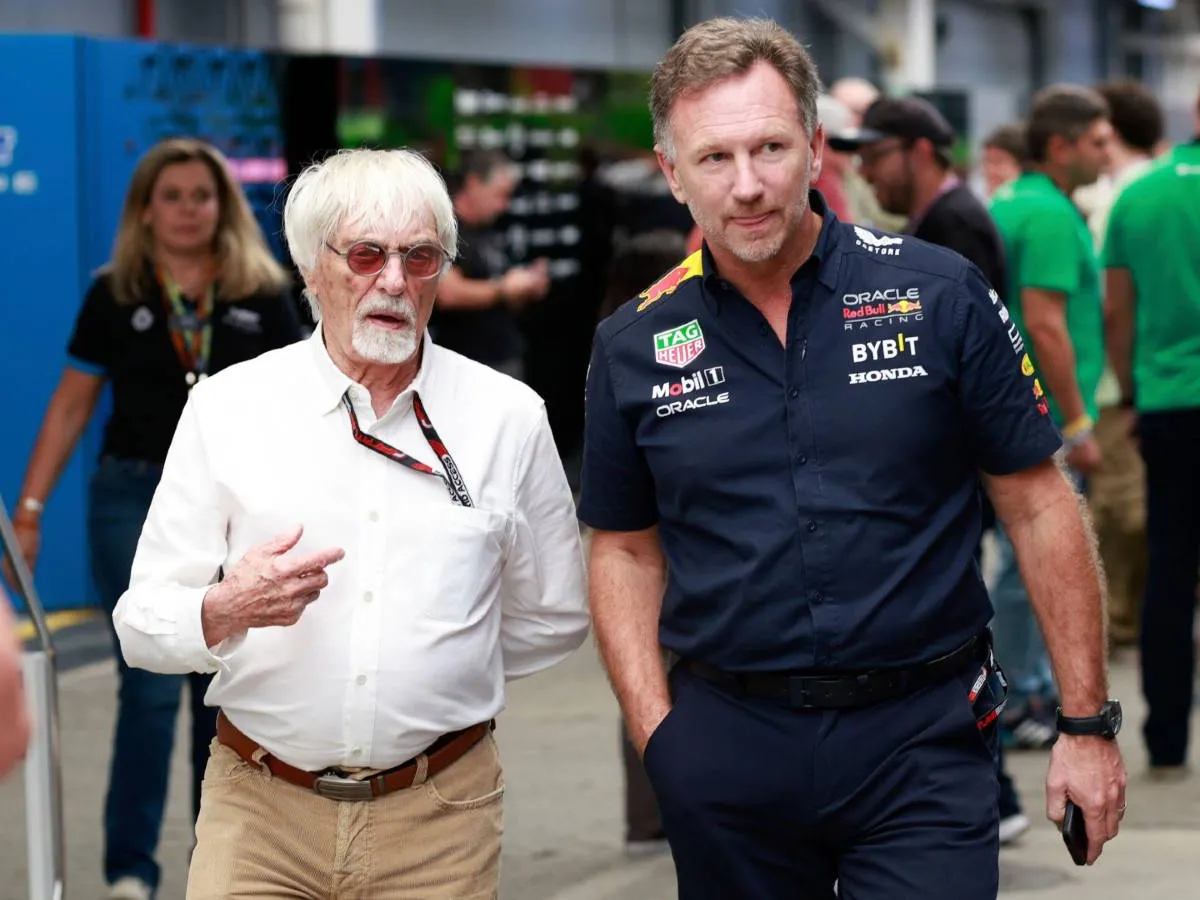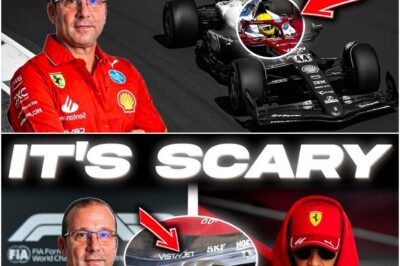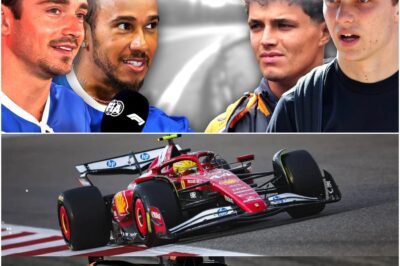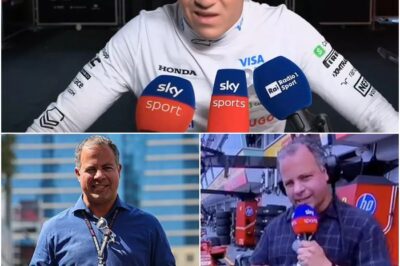Christian Horner’s Shock Exit and the Power Play That Could Reshape Formula 1
Formula 1 has never been short of drama, but the story dominating the paddock this season isn’t about championship points or overtakes. Instead, it’s a power struggle off the track, centered around one of the sport’s most influential figures: Christian Horner.
Horner’s abrupt exit from Red Bull after two decades at the helm sent shockwaves through the sport. Now, the rumor mill suggests an even bigger twist—a potential return not as a team principal, but as a team owner. With whispers of high-stakes deals involving Aston Martin, Alpine, and even the guiding hand of Bernie Ecclestone, the future of the F1 grid may be on the verge of a seismic shift.
This article dives into the swirling speculation, separating credible reporting from paddock fantasy, and exploring what Horner’s next move could mean for Formula 1.

A Shock Exit That Shook the Paddock
When Horner was removed as Red Bull’s Team Principal and CEO following the 2025 British Grand Prix, the move was described by insiders as ruthless and swift. For a man who delivered six Constructors’ Championships and eight Drivers’ titles, the decision seemed almost unthinkable.
Yet this wasn’t a routine reshuffle. Unlike Mercedes’ Toto Wolff, Horner never held equity in Red Bull Racing. He was a highly successful employee, not an owner. In Red Bull’s corporate structure, even his unprecedented track record offered no ultimate job security. The decision underscored the brutal realities of F1’s corporate governance: success alone doesn’t guarantee protection when shareholders’ priorities shift.
For Horner himself, the shock was palpable. Reports suggest he had long harbored ambitions to go beyond management—to become an owner in the sport. His sudden ousting may have only accelerated that ambition.
The Allure of Ownership
Unlike taking another principal role, ownership offers permanence and power. Horner has long been compared to Toto Wolff, whose equity stake in Mercedes ensures his influence extends far beyond the pit wall. Horner never achieved that at Red Bull, and sources suggest that any return to the grid will only come if he can secure a genuine ownership role.
Bernie Ecclestone, the sport’s former supremo and Horner’s longtime ally, has openly hinted at this. Without a stake of his own, Ecclestone said, Horner might not come back at all. That sets the stage for the central question: how could Horner actually buy into one of F1’s billion-dollar franchises?
Enter Bernie: The Eternal Power Broker
Even at 94, Bernie Ecclestone remains a formidable presence in Formula 1’s financial and political circles. His name still carries weight in boardrooms across the sport, and his criticism of Red Bull’s handling of Horner’s exit was seen as more than personal loyalty. It was a signal—a reminder that Ecclestone is still capable of pulling strings.
Rumors suggest Ecclestone could act as a facilitator, perhaps even a silent partner, in any deal that brings Horner back. His decades of contacts and credibility with high-net-worth investors could prove invaluable in arranging the hundreds of millions needed for a stake in an F1 team.

The Teams in Play: Aston Martin vs. Alpine
So which team could realistically offer Horner an ownership pathway? Two names dominate speculation: Aston Martin and Alpine.
Aston Martin: A Closed Shop?
At first glance, Aston Martin looks tempting. Backed by billionaire Lawrence Stroll, the team has invested heavily in infrastructure and brand positioning. However, credible reporting suggests little substance behind the rumors linking Horner to a stake. Stroll maintains near-total control, and recent partnerships with investors like Aramco make external buy-ins unlikely unless he initiates them.
For now, the Aston Martin whispers appear to be just that—whispers.
Alpine: A Realistic Target
Alpine, on the other hand, is another story. Renault, the team’s parent company, has already sold a 24% stake to Otro Capital and others in 2023. More recently, serious reports suggest they are considering selling an additional 20% stake, valued at around £298 million ($400 million).
Unlike Aston Martin, Alpine’s willingness to restructure and bring in external investors is well documented. This makes it the most credible pathway for Horner’s ownership ambitions.
The Numbers Game: Financing a Minority Stake
Buying into Formula 1 is no small feat. With Alpine valued at over $1.2 billion, even a minority share represents an enormous outlay. For Horner, this wouldn’t mean writing a personal check. Instead, it would likely involve a consortium of investors, perhaps structured through private equity—mirroring the same mechanisms that brought new stakeholders into Alpine in 2023.
This is where Ecclestone’s role becomes critical. His ability to open doors to capital, negotiate terms, and legitimize the deal could prove decisive. His involvement, even as a silent partner, would signal to others that the project is serious and worth backing.
Risks and Rewards
The stakes couldn’t be higher. If Horner secures ownership, it would be a career-defining redemption arc: from ousted principal to co-owner of a rival team. It would transform his narrative from downfall to defiance, cementing his legacy as more than just a manager.
For Ecclestone, it could be one final act in a career that has shaped the sport more than any other. Even in his nineties, he could again prove that he remains an F1 kingmaker.
But the risks are enormous. Formula 1 is unforgiving, financially brutal, and reputationally unforgiving. A failed bid or an unsuccessful ownership stint could tarnish Horner’s legacy rather than elevate it. The financial exposure is immense, and without results on track, even the most glamorous entry can turn sour.

What It Means for the Grid
Should Horner succeed, the ripple effects across Formula 1 would be significant. A new power player with Horner’s experience and connections could disrupt the driver market, influence technical partnerships, and shift the competitive balance of the grid.
It would also serve as a reminder that in Formula 1, the drama is never confined to the track. Ownership battles, financial maneuvering, and political influence shape the sport just as much as aerodynamics and strategy calls.
Conclusion: Alpine or Bust?
When you strip away the noise and focus on credible reporting, one conclusion emerges: if Christian Horner returns to Formula 1, it will almost certainly be via a minority stake in Alpine.
The Aston Martin speculation may generate headlines, but it lacks concrete details. Alpine, by contrast, has precedent, valuations, and a parent company actively seeking investors. Add Ecclestone’s possible involvement, and the outlines of a genuine power play begin to take shape.
Whether Horner succeeds or not, this saga underscores the ambition and obsession that fuel Formula 1 at every level. For Horner, the next chapter could be his boldest yet—an attempt not just to manage a team, but to own a piece of the world’s fastest game.
News
Lando Norris’ dream of becoming F1 champion in 2025 is not over yet. Despite fierce competition, he still has a shot. What steps must he take to secure the title, and could he pull off the ultimate upset in the final races of the season?
How Lando Norris Can Still Win the 2025 F1 Title: A Realistic Breakdown Formula 1 seasons rarely fail to deliver…
Max Verstappen’s reaction to Red Bull’s disastrous performance has sent shockwaves through the paddock. Furious at his team’s lack of preparation, Verstappen makes it clear that frustration is at an all-time high. Is this the breaking point for the reigning champion and his relationship with Red Bull?
Max Verstappen’s Frustrations with Red Bull and Racing Bulls: A Closer Look at the Current F1 Drama Max Verstappen, the…
Ferrari Transfer Drama: Max Verstappen’s SHOCKING Response to the Rumors and Hamilton’s HORRIBLE 2025 Season Forecast: Max Verstappen breaks his silence on the ongoing Ferrari transfer speculation, alongside his bold take on Lewis Hamilton’s future in Formula 1. Will 2025 really be Hamilton’s worst season ever?
Max Verstappen, Lewis Hamilton, and Ferrari: The Unfolding Drama at Monza The Monza Grand Prix is more than just another…
After a dramatic qualifying session at the Monza GP, Ferrari engineers have detected a critical issue in Hamilton’s car that could have major implications for the rest of the weekend. What exactly did they find, and how might it affect his race strategy and chances of victory?
Ferrari’s Game-Changing Discovery at Monza: The Road to 2025 Glory Monza 2025 will go down in history not only as…
Ferrari’s aggressive performance at Monza has put McLaren in a tense situation, with Antonelli facing the latest setback. The pressure is mounting, and the Italian team’s relentless drive for victory is only intensifying the stakes. Will McLaren be able to respond, or is this the breaking point?
Lando Norris Fastest on the Opening Day of the Italian Grand Prix as Kimi Antonelli Endures a Day to Forget…
Sky Sports issue apology as F1 star furious with rival swears during live interview!
An incident during qualifying for the Italian Grand Prix led to Racing Bulls driver Isack Hadjar turning the air blue…
End of content
No more pages to load












